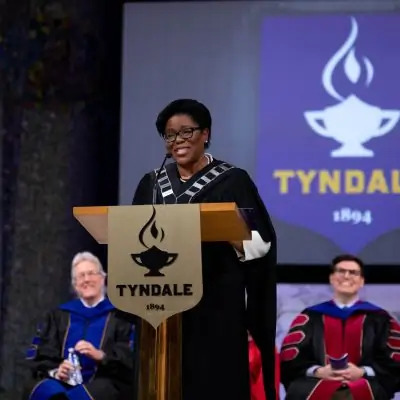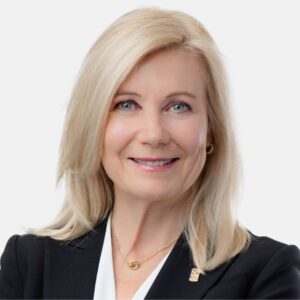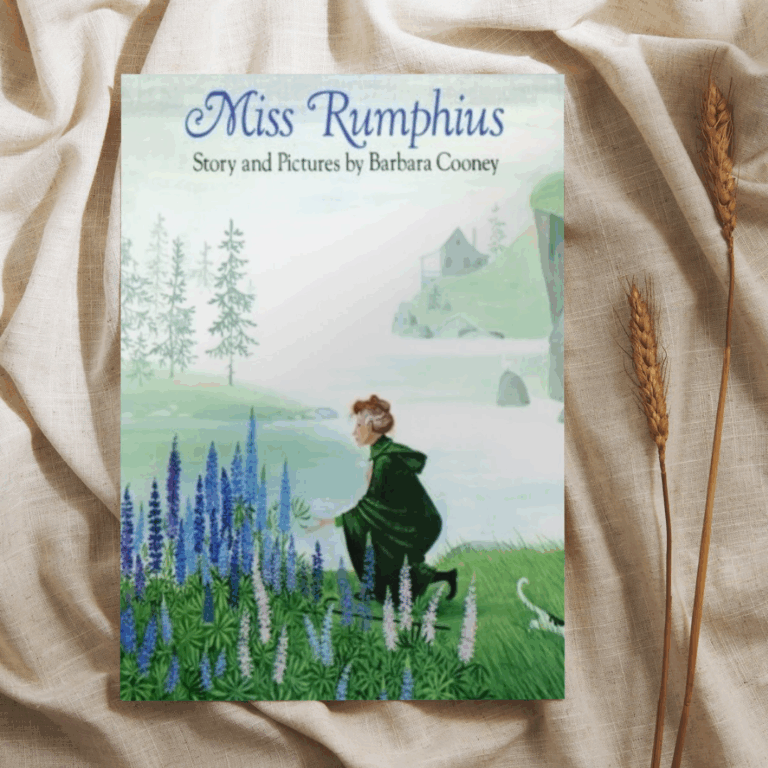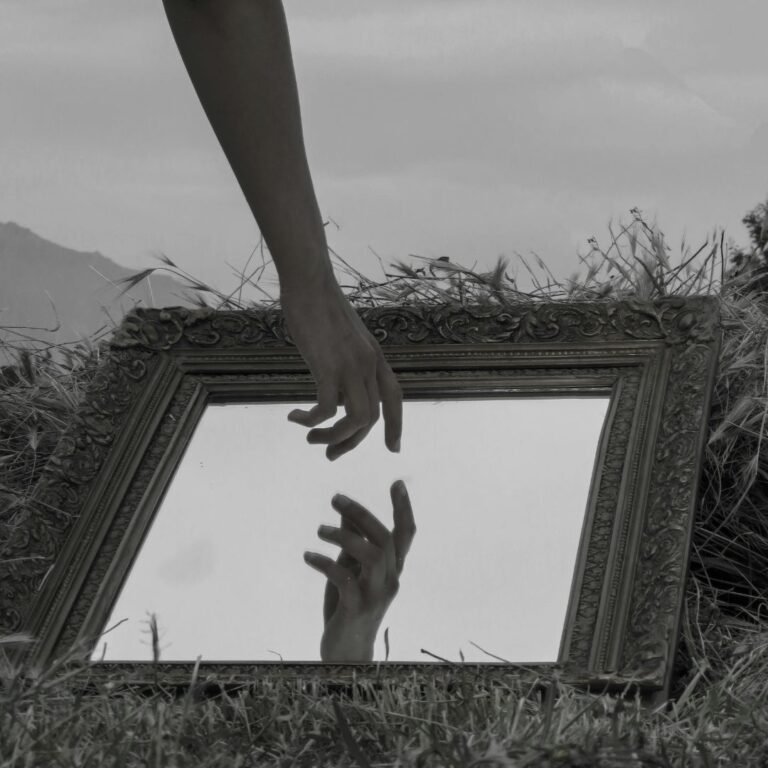Ginella Massa – Canada’s first hijab-wearing national television host
Ginella Massa is an award-winning journalist and the host of Canada Tonight with Ginella Massa on CBC News Network. She is also Canada’s first hijab-wearing television news reporter, local anchor, and national host. Throughout her career, Ginella has worked hard to make sure that diverse voices and stories are heard.
In this energetic and motivating interview, Ginella talks to Jen and Catherine about her identity as a Muslim, what drives her forward in her professional life, what she thinks about social media, and much more.
Note: This transcript has been edited for clarity and length.

Jennifer Stewart: What was it like covering the pandemic this past year?
Ginella Massa: I started a new job, I started the show during the pandemic, which was a challenge in and of itself. But that kind of helped be our guiding light, trying to figure out how can we help people navigate these crazy times. Our mandate this year is to speak to people at the heart of the stories of what’s happening, people who are first-hand impacted by what’s going on. And really to answer some of the questions that we were having at home with our families, with our friends, the conversations and questions that we wanted answered.
So, we just wanted to be a source for people to help them navigate and digest all of this fast-changing information. I feel honoured and I feel a duty to Canadians to try to be solution-oriented in the sense of what kind of journalism we’re doing to actually offer them news that they can use, to offer them a window into the experiences of people that they may not be in contact with, or they may not have conversations with. So that was the exciting part about doing the show during the pandemic.
Catherine Clark: Is it true that you considered radio instead of television first?
Ginella Massa: Yes, I did. I have worked in radio, but growing up I was always that kid who wouldn’t stop talking. That was the number one comment on my report card, that she is a good student but she talks too much when she’s not supposed to.
So, I always knew that I wanted to do something in the spotlight, something that lent itself well to my gifts, like gift of the gab. My mom said, “Maybe you want to go into broadcasting hosting a show or something like that.” And I thought, yeah, maybe I’ll go into radio because I don’t know that they would put anyone who looks like me on TV. I hadn’t seen it before, anyone who wears hijab, and I was quite young, nine years old, having this thought that it wasn’t a career that I could pursue because I’d just never seen it done before.
And my mom was the one who was like, “Don’t change or diminish your dreams or make yourself smaller because you think that other people wouldn’t accept that, right? Just because it hasn’t been done before doesn’t mean you can’t do it.” So, she really encouraged me to go after the things that I wanted to do and not let other people’s perception of me stop me.
Jennifer Stewart: In 2016, you were the first woman in a hijab to anchor a major newscast. Do you take time to realize the boundaries that you’ve broken and that you’ve torn down for other women?
Ginella Massa: Honestly, sometimes I try not to think about it too hard. Because it’s a lot of pressure.
I just try to go in to work every day and do my job and be the best journalist that I can be.
But I still get these surreal moments where I’m flipping channels and my commercial comes on TV and my face is there. Those moments sometimes catch me off guard.
Catherine Clark: How do you find that natural place in between that allows you to embrace who you are and what you’ve managed to do, but still just keep going on and being who you are?
Ginella Massa: I remember working my first on-air job in Kitchener back in 2015, as a television reporter, and being really scared and nervous about what the reaction was going to be. Obviously, my first time on air as a young journalist, you don’t want to mess up or make them feel like they shouldn’t have hired you.
But on top of that, not knowing if they were going to show up outside of the station with pitchforks. I was pleasantly surprised by the overwhelmingly positive reaction that I got from the community. I remember getting a message from a woman who said, “I’m a Muslim woman, I live here in Kitchener, and sometimes I feel a little bit nervous being out in hijab and feeling like people are looking at me, and maybe I don’t belong here. And then I turn on the TV, and I see you. And that reminds me I do belong here. And I am part of this community and an important one.” And so those kinds of messages make difficult days easier.
It can get a little bit annoying, sometimes it feels like that’s the only thing I can talk about is diversity. But I have to talk about it, because I have an opportunity in this space to get face time with people in decision-making positions, to bring my opinions in a way that other people from my communities don’t get and other marginalized voices don’t always get. I feel a responsibility to use it.
Catherine Clark: You have public profiles, but you also have social media accounts and a lot of followers. That can be a double-edged sword because of people who say stuff, and you can have people who are pretty awful. How do you handle that?
Ginella Massa: I’ve learned to take the good with the bad. I think that it would be very easy for me to say, “I’m not going to engage in social media.” But it’s a means to connect with people in a real way. Obviously there are the haters. I have to recognize that most of the time, the criticism that comes to me isn’t criticism about my work or my journalism, it’s very often racist, Islamophobic.
If you want to engage about an interview that I’ve done, my journalism, I’m happy to have that conversation. And I have had that conversation with people on social media.
It’s also been a place where I’ve sourced stories. It can be a voice for people to speak out about something that’s happening in their community. And before it was much harder to access journalists and media and kind of break past those gatekeepers.
Jennifer Stewart: What would you say to somebody who wants to potentially pursue a career in journalism, but isn’t sure what that looks like to them?
Ginella Massa: You have to love it. You have to be doing it for the right reasons. A lot of people look at the show and see glitz and glamour. But it’s really not. Journalism is a shrinking industry. There’s less money, there’s less resources. You’re asked to do a lot with very little.
For me, as I said, I love that every day is different. I never know what my day is going to look like, who I’m going to talk to, what stories are going to break. That’s really exciting for me, to not feel like my job is monotonous. I don’t just sit at a desk and type away or anything.
For anyone who wants to get into journalism, you have to be willing to work hard, you have to be willing to do the not-so-fun shifts, you have to be willing to go to maybe a smaller town that you’ve never heard of. And you have to be willing to make some sacrifices. But if it’s something that you love, and you’re doing it for the right reasons, then it won’t feel like work.
Catherine Clark: Who’s your inspiration when you wake up in the morning?
Ginella Massa: I’ve talked a lot this last year, when I get interviewed about my new show, about my mom, and how much of an encouragement and cheerleader she was for me. She came to Canada with me and my sister with not a lot of English and $100 in her pocket. She was very resourceful. And she made her way in this country by not asking permission, by not waiting for things to be given to her, but by paying her own way and pulling up a seat to the table and making her own path. That’s something I’ve followed a lot, and especially in this career — opportunities may not exist for you, but that doesn’t mean that you can’t create them for yourself.
Jennifer Stewart: What’s the biggest lesson you’ve learned so far on your journey?
Ginella Massa: I’ve learned a couple of things. I’ve always been a bit of a people pleaser. And I’ve had to learn how to say ‘no,’ that ‘no’ was a full sentence.
I’ve had to learn to demand respect and know my own worth. And realize that people only treat you the way that you let them. That’s been a really important part of my journey, to allow myself to speak up when I feel it’s really important to.
The other thing that I think I’ve learned is that persistence is key. I tell young journalists this all the time: it’s not the most talented, it’s not the most skilled person who is going to get the job. It’s the one who has the most gumption, the one who’s the most persistent, the one who doesn’t take ‘no’ for an answer. You have to be able to back that up with hard work ethic and good talent and skills, but being persistent is key.







